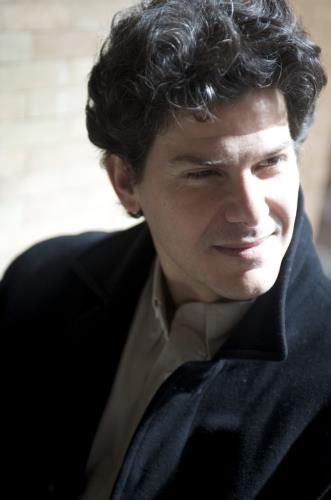A full time researcher in university and an amateur art commentator, Cheong obtained his master’s degree in Public Policy at Willy Brandt School of Public Policy at the University of Erfurt and is formerly a clarinettist of the Erfurt Philharmonic Orchestra in Germany. He loves classical music and now serves as conductor of the orchestra in Escola Choi Nong Chi Tai, by which he can connect art to everyday life. Cheong is also a book lover.

Counter-tenor Sébastien Fournier Photo courtesy of Jean Matéve
Organised by the Alliance Francaise, the inaugural Macao Sacred Music Festival featured the performance of counter-tenor Sébastien Fournier, and the Macao Orchestra showcased works by M. A. Charpentier, Handel and Mozart under the baton of Lio Kuok Man, a Macao-born musician and assistant conductor of the Philadelphia Orchestra. The architectural design of St Dominic’s Church, with its grand, elongated space and high ceiling, enhanced the music with its excellent acoustics. However, the audience seated at the back might enjoy a less appealing sound due to the difficulty in sound projection. By comparison, the architectural design of St Joseph’s Seminary and Church poses less limitation as such. With a more accessible location, St Dominic’s Church attracts tourists and visitors who attend the concerts out of curiosity, but such church visitors are generally less aware of the protocol at concerts and some of them would even leave the concert halfway through. Moreover, since the organiser did not mention that photographs are prohibited, there were quite a lot of visitors in the audience taking snapshots with their mobile phones during the concert. On top of this, the lighting inside the venue was not dimmed until the show went on for some time. Fortunately, the organiser became aware of this situation and dimmed the lighting eventually. This gesture certainly helped the audience stay focused during the concert.
As a first-time organiser of this event, Alliance Francaise has showcased the rare gem of a counter-tenor musician in Macao. The press release they provided rather inaccurately called Fournier a male tenor. The term counter-tenor can be understood as the highest male tenor. Or, sometimes it is also called a falsetto or a male alto. In terms of music jargon, it means that the male singer adopts a falsetto to perform the singing range of a soprano. Therefore, the definition for a male counter-tenor is still subject to interpretation. However, the most widely-accepted term is that of a male falsetto. From a historical point of view, the diminishing of male falsetto singers is related to the castration of singers during the 16th century. In order to preserve a childlike, high-pitched voice, many male tenors underwent castration, a surgery that helped them retain the clarity of voice. The famous musician, Nicola Porpora, was known for his success in discovering many talented male tenor performers, including the famous musician, Farinelli, who was castrated by his brother. Allegedly, Farinelli’s brother helped to “take care of” Farinelli’s own wife. To learn more about Farinelli’s life, one must watch Farinelli, the film about his life.
At this concert, a substantial range of works by Handel was covered, including Dover Giustizia. As a result of the prolonged performance of the vocalist, the concluding tenor seemed rather weak. Despite the similarity in pitch shared between a male counter-tenor and a female soprano, the rendering of their voices are quite different: while a male counter-tenor is not as shrill as a soprano, it often feels more approachable and steady. Under the baton of Lio Kuok Man, the Macao Orchestra performed with much poise, and the baroque music was well-articulated. In Handel’s Water music HWV 349 Suite No. 2 in D major, the trumpet appeared less satisfactory. Nevertheless, the artistic merit of the concert is considerable. In fact, it is worth watching the Macao Orchestra led by Lio, even if one is simply interested in the counter-tenor, which is so rarely found nowadays. Moreover, it is an exciting opportunity to listen to orchestral music from the Renaissance and Baroque periods (the orchestra also performed a piece by Mozart). Let us hope that the Alliance Francaise will continue to host this Sacred Music Festival, bringing us more classical music in Macao and diversifying people’s taste for different types of music.